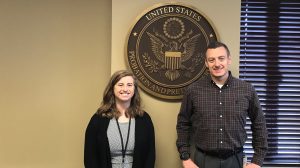
Three graduates of the UM criminal justice master’s program, including Emma Burleson (left) and William Fennell, serve as officers in the U.S. Probation Office for the Eastern District of Arkansas. Submitted photo
OXFORD, Miss. – Emma Burleson, a 2017 graduate of the master’s program in criminal justice at the University of Mississippi, spends her days protecting the community by supervising people charged with federal crimes while they await trial and after they have been convicted.
Her ultimate responsibility as a U.S. probation officer for the eastern district of Arkansas is to connect offenders to the resources they need to thrive on the outside – an opportunity to improve lives and the reason Burleson pursued her line of work.
“I was interested in pursuing a job within the field of criminal justice that was as much about healing and bettering individuals as it was about enforcing the law,” Burleson said. “I believe that the role of a probation officer is just that. We seek to not only protect and improve the community, but also to genuinely help the clients that we supervise make positive changes in their lives.
“I definitely find it rewarding to be working for a department that is so focused on improving individual lives and protecting and healing the community. I do not believe I could have found a better place for me.”
She is among three recent UM graduates who work in the office, along with William Fennell and Ashley Pratt. All three credit their time at Ole Miss with guiding their career paths.
As U.S. probation officers, these alumni are responsible for gathering and verifying information about people who come before the courts, preparing reports that judges rely on to make release and sentencing decisions and supervising those released to the community by the courts and paroling authorities.
For Burleson, the most rewarding aspect of her job is directing offenders to services that help them stay on the right side of the law, including substance abuse treatment, mental health treatment, medical care, training and employment assistance.
Burleson credits her Ole Miss experience for her smooth transition to the workforce.
“I was granted invaluable experiences as a graduate assistant and through my participation in academic conferences, where I presented my thesis research,” she said. “My time at Ole Miss helped give me the skills and knowledge I needed to successfully get through the hiring process and succeed at my job.”
Fellow probation officer Fennell found his passion for restorative justice through his faith-based volunteer work with the Mississippi State Penitentiary and work with Linda Keena, UM interim chair of legal studies.
“Dr. Keena’s passion for community corrections was a major influence in my decision to pursue a career in probation,” Fennell said. “She also helped me develop the writing skills that I rely on in my current position.”
Fennell investigates the histories of defendants who are awaiting sentencing in federal criminal court and prepares reports to offer judges as much relevant information as possible before imposing a sentence. He previously spent two-and-a-half years supervising federal defendants who were awaiting trial on bond and federal offenders who had been released from prison or were sentenced to probation in northeastern Arkansas.
“That supervision included helping clients use community resources and counseling services to help them readjust to society, helping them improve their decision-making process to avoid future issues and ensuring their compliance with all court-ordered conditions of release,” he said. “In essence, my job was to help protect the community by providing clients with a meaningful opportunity to change.”
Pratt graduated with her Master of Criminal Justice from Ole Miss with a job offer on the table from the Transportation Security Administration. Shortly after working part time with TSA, she began working for the Federal Bureau of Prisons.
In March, she joined Fennell as a U.S. probation officer, followed by Burleson in August.
“The driving force behind my career path was my child,” Pratt said.
Pratt said she is grateful to Keena and Danny Hall, senior lecturer in legal studies, for guidance during her time at Ole Miss as she pursued her graduate degree as a single mother.
“Both of these professors not only understood it, they embraced my child with open arms,” Pratt said.
“It is important to me that my child understands that everyone deserves a second chance, and that given the right help, people who were once labeled as ‘bad’ people could change their way of thinking and abide by the law.”
Eddie Towe, chief U.S. probation and pretrial services officer for the district, relies on universities with quality programming, such as the Ole Miss criminal justice program, to continually provide great officer candidates.
While Burleson, Fennell and Pratt lacked extensive probation experience, their aptitude, motivation, passion and personality traits matched those of highly functioning officers. Their submission packets, education, references, backgrounds and interviews also indicated they were the best candidates.
“In combination with working in an outcome-based learning organization that provides intensive initial training programs along with ongoing education and research opportunities, Ashley, William and Emma will make great officers,” Towe said.
Undergraduate degrees in criminal justice at UM offer three distinct emphases in corrections, homeland security and law enforcement. The Master of Criminal Justice program requires 36 hours of coursework and is based on the principle that students need skills and experiences in the areas of critical thinking, scholarly research, analysis, communication and ethical thinking.
Both undergraduate and graduate-level programs are offered through the Department of Legal Studies in the School of Applied Sciences.
The UM School of Applied Sciences offers professional preparation programs that integrate academic study, clinical training, creative research, service-learning and community outreach, leading to the development of leaders whose professional endeavors will improve health and well-being. For more information, go to http://sas.olemiss.edu/.
